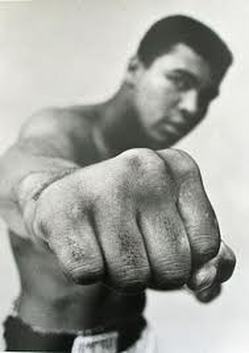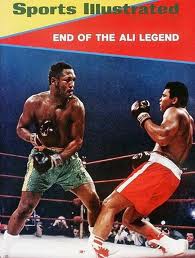
If I ever had any doubt about the power of Muhammad Ali as a cultural icon, it vanished when actor Gregory Hines broke down on the phone with me in 2002 as he recalled the emotional devastation he felt over the fighter's brutal 1971 loss to Joe Frazier. For Hines and millions of others around the globe, the match was about so much more than who walked away with the championship belt at the end of the night. It was intertwined with issues of race, religion, politics, the generation gap, individualism and others tearing at the fabric of society at the time.
In my 60th birthday tribute to Ali from The Hollywood Reporter (below), I explore what made the champ "The Greatest" with noted actors (Michael J. Fox, Kris Kristofferson, Rod Steiger, etc.) authors (George Plimpton, Budd Schulberg, Gay Talese), TV journalists (Ed Bradley, Bryant Gumbel) and rapper Chuck D.
It wasn't hard getting people to talk about Ali. In fact, I have never encountered celebrities so eager to discuss something other than themselves and their latest project. Most were reached the traditional way, through their press reps; others, I found through the White Pages (Talese, Plimpton). With Schulberg -- the noted sports writer, screenwriter (On the Waterfront, A Face in the Crowd) and novelist (the seminal exploration of Hollywood venality What Makes Sammy Run?) -- it took several days of scouring the internet and a wrong turn in Florida with the widow of another Budd Schulberg before I finally located him in the small town of Quioque, Long Island.
Many of those I interviewed for the article have since passed away, including Hines (who died of liver cancer in 2003). After battling Parkinson's Syndrome for more than three decades, Ali passed away on June 3, 2016, at the age of 74.
In my 60th birthday tribute to Ali from The Hollywood Reporter (below), I explore what made the champ "The Greatest" with noted actors (Michael J. Fox, Kris Kristofferson, Rod Steiger, etc.) authors (George Plimpton, Budd Schulberg, Gay Talese), TV journalists (Ed Bradley, Bryant Gumbel) and rapper Chuck D.
It wasn't hard getting people to talk about Ali. In fact, I have never encountered celebrities so eager to discuss something other than themselves and their latest project. Most were reached the traditional way, through their press reps; others, I found through the White Pages (Talese, Plimpton). With Schulberg -- the noted sports writer, screenwriter (On the Waterfront, A Face in the Crowd) and novelist (the seminal exploration of Hollywood venality What Makes Sammy Run?) -- it took several days of scouring the internet and a wrong turn in Florida with the widow of another Budd Schulberg before I finally located him in the small town of Quioque, Long Island.
Many of those I interviewed for the article have since passed away, including Hines (who died of liver cancer in 2003). After battling Parkinson's Syndrome for more than three decades, Ali passed away on June 3, 2016, at the age of 74.
Your browser does not support viewing this document. Click here to download the document.

When Joe Frazier passed away in November 2011, I remembered how my editors cut the portion about his incessant racist taunting of Frazier because, well, it's not nice to say bad things about someone on their birthday. The result: Ali's saintly legend was further burnished, while Frazier's greatness was once again obscured by its growing shadow. So I decided to dig out the deleted paragraphs and post them here.
Ali’s behavior could not always be characterized as noble. There were private infidelities made embarrassingly public (such as when he introduced future third wife Veronica Porsche as his wife to Philippine President Ferdinand Marcos on international TV while then-current wife Belinda watched at home in Chicago) and public statements that were sexist or racist. The most debated of the latter were his repeated verbal attacks on Frazier, whom he alternately mocked as the white man’s champion and a big, ugly gorilla. At one point, at a press conference leading up to their 1975 “Thrilla in Manila,” Ali pulled out a rubber gorilla doll (which he referred to as Frazier’s “conscience”) and pummeled it with his fist.
“I think it was playful,” says Plimpton. “There are many ways you can call somebody a son of a bitch. You can be tough and say it hard or you can be lighthearted and make them laugh.”
["Ali" screenwriter Gregory Allen] Howard is not so sure: “If a white man had done that, he’d have been excoriated. All Ali will say about it is, ‘Just selling tickets.’ I’ve asked everyone in the inner circle, and no one can explain to me what was his almost racist obsession with Joe. You know, Joe’s kids used to come from school crying and say, ‘Daddy, kids say you’re a gorilla.’ It was horrible.”
Plimpton feels that Ali’s psych-out tactics ended up backfiring with Frazier.
“I think the reason he had so much trouble with Frazier, was that Frazier fought out of this terrible rage at what he’d been called," he says. "It made Frazier twice the fighter that he was.”
Ali’s behavior could not always be characterized as noble. There were private infidelities made embarrassingly public (such as when he introduced future third wife Veronica Porsche as his wife to Philippine President Ferdinand Marcos on international TV while then-current wife Belinda watched at home in Chicago) and public statements that were sexist or racist. The most debated of the latter were his repeated verbal attacks on Frazier, whom he alternately mocked as the white man’s champion and a big, ugly gorilla. At one point, at a press conference leading up to their 1975 “Thrilla in Manila,” Ali pulled out a rubber gorilla doll (which he referred to as Frazier’s “conscience”) and pummeled it with his fist.
“I think it was playful,” says Plimpton. “There are many ways you can call somebody a son of a bitch. You can be tough and say it hard or you can be lighthearted and make them laugh.”
["Ali" screenwriter Gregory Allen] Howard is not so sure: “If a white man had done that, he’d have been excoriated. All Ali will say about it is, ‘Just selling tickets.’ I’ve asked everyone in the inner circle, and no one can explain to me what was his almost racist obsession with Joe. You know, Joe’s kids used to come from school crying and say, ‘Daddy, kids say you’re a gorilla.’ It was horrible.”
Plimpton feels that Ali’s psych-out tactics ended up backfiring with Frazier.
“I think the reason he had so much trouble with Frazier, was that Frazier fought out of this terrible rage at what he’d been called," he says. "It made Frazier twice the fighter that he was.”
